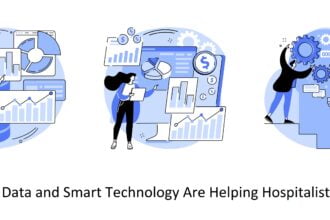Artificial intelligence has helped many commercial businesses improve their operations. However, many public entities are also leveraging AI technology to serve the public more efficiently. Even many libraries have started taking advantage of AI technology. We talked about the opportunities to use big data for library marketing, but there are other advantages as well. Erin Nevius, a content strategist for the American Library Association wrote an article in April about the benefits that AI presents for libraries throughout the world.
Nevius said that librarians “are in a unique position to rise to the challenge that AI presents to the field” in her post. The benefits of AI for libraries are numerous, including aiding with the discoverability with new collections and improving machine translation between languages.
One of the other benefits of AI for libraries that Nevius didn’t touch on is the use of RFID. Radio-frequency identification (RFID) and smart barcode technologies are changing the library’s way of working. Through radio waves and barcodes, computers and similar can identify objects, thus sort them into categories and put their corresponding data in the library systems. AI technology has created the smart technologies needed to make RFID possible for libraries.
As such, libraries are becoming more effective by saving time handling material through these library automation systems powered by AI. Here are two examples of how these technologies are helping and changing libraries.
1. Improve ergonomics through self-service equipment
Through RFID and barcode technologies, you can have self-checkout and check-in, so the handling of books becomes more efficient as the borrowing, return and renewal process is done by the visitors and with minimal staff involvement.
By saving time in this way, you can use the released staff time for other activities and improve workplace ergonomics throughout the workday. This increase in efficiency means the visitors can feel welcome as the staff has more time to care for their other needs, such as helping a visitor find the book they are looking for.
Additionally, the self-service equipment will provide the visitors with fast-paced service that creates less waiting time and extended library services, such as borrowing books outside of staffed hours. AI technology can help customers access them easily and address some of the most pressing issues they would encounter in the process without the need for staff assistance.
2. Automated material handling
AI technology has also obviously led to the inception of automation. Through AI-driven RFID and barcode technologies, it is now possible to make material handling automated. These AI technologies can identify the material according to the categories they need to be sorted into, thus reducing the time and effort spent handling returned books.
To explain shortly how this works through RFID. First, you decide how many categories you would like to sort the returned books into, such as categories according to genres or shelf placement. The AI can assistance with all of these processes.
Second, a book is returned through the self-check-in system, and the system sends out a radio wave that activates the tag on the book. The tag then sends a radio wave back, which is then translated into data that identifies the book. The AI can synthesize the data in a format that the reader can understand.
Third, the system and machine then place the book into the specific category it belongs to, and as the last step, the staff is merely tasked with emptying different categories’ books when they are filled.
By using this system and corresponding machines, you can meet the visitor’s needs by having longer opening hours while also caring for staff by creating a healthier working space, as the machines take over the tedious work that can potentially cause physical stress.
All in all, these are only two of many ways in which the RFID and AI-driven barcode technologies are helping libraries thrive through automation.
AI-Driven RFIDs Are the Future of Library Management
AI technology is changing the way libraries and other public services are managed. This is an example of how smart cities are changing in response to advances in data technology. One of the best ways that libraries can leverage AI is through the use of RFIDs. The details listed above are an illustration of these benefits.










